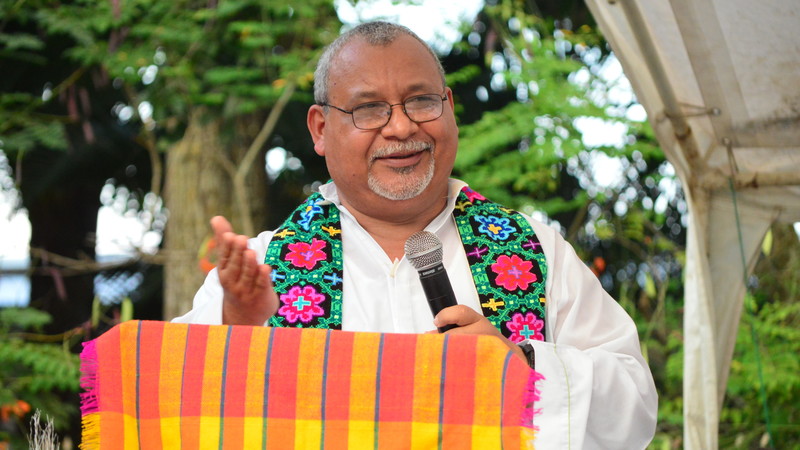Towards a world after coronavirus in Honduras

Father Melo is the Director of CAFOD’s longstanding Church partner ERIC-Radio Progreso in Honduras, which works on communications and research focusing on migration, integral ecology and defending human rights. As ERIC celebrates its 40th anniversary, Father Melo talks about the current situation in Honduras, the impact of coronavirus, his ideas for an alternative development, the organisation’s achievements and their hopes for the next 10 years.
Hello friends. It gives me great pleasure to share with you some reflections from Honduras which will be brief but sincere, from my heart to yours.
Honduras is experiencing a special situation because of the coronavirus. We know that the pandemic affects all of humanity and all of humanity are living in uncertainty. In a country like Honduras, this pandemic is linked to a historical process of destroying our institutions, the environment, rivers, forests and communities. Our economic model has been built on the privatisation of public services where human rights have been lost, and the rights of nature are disrespected.
This process of privatisation means that those who are sick have limited access to medicine, hospital treatment and medical equipment in hospitals is getting worse. So when a pandemic comes, we find ourselves in a very vulnerable situation. As a result of the lockdown we are condemned to live in confinement for many weeks. 70 per cent of the population works in the informal sector. They must stay confined and therefore lose their source of work. The disease combines with another factor – hunger.
Pray with us for all those affected by the coronavirus pandemic
I want to tell you, my friends, that this pandemic is occurring at a time when investments are focusing on extractive projects leading to the continuous destruction of the environment.
An alternative economic model
I like to talk about building a model of wellbeing or, as it is said in South America, a model of “living well”. A commitment by humanity to itself based on the love of community, the love of the land, the love of planting, the love of health and the love of education. This commitment to humanity is understood as intimately linked with nature and is understood as a gift from God.
Communities in Honduras, particularly those in the countryside are threatened. Their main heroic task is to survive. People are threatened by violence, drug trafficking and repression, especially young people. One of the challenges we face is how to achieve a model of “living well” where communities can remake their lives in their own land, here in Honduras.
We must invest in the land, in planting and in the community. We need to invest in education and health so that the people of Honduras do not have to permanently migrate to other countries. Stopping migration is not done by decree nor by building a wall in Mexico or the United States. It is not done through increased militarisation and installing fear into the community who want to leave.
Stopping migration means providing real alternatives where communities can be protagonists. For this reason, the relationship with mother earth, with the communities, with education and health are intimately linked to this model of living well. We must defend the rights of communities, defend the lives of young people and women who are permanently threatened. The Church must help with this.
Learn more about CAFOD’s work in Honduras
ERIC’s achievements
Here in Honduras we are very grateful for our very long relationship with CAFOD. We at ERIC are celebrating our 40th anniversary – 40 years serving a country where the absence of analysis and research has been very challenging. We have been carrying out opinion polls for a decade, in a country where polls are synonymous with manipulation. ERIC has defended human rights, migration and young people.
Read more about human rights defenders and coronavirus
Through Radio Progreso we have been able to investigate the causes that give rise to violence and inequality and contribute proposals that guide us towards an alternative economic model. An alternative cultural and spiritual model. A social model that can lead us to building a citizenship where we all can live with dignity, without having to leave, emigrate or face violent situations.
Hopes for the future
The model our country has followed over the last 40 years has collapsed. We are trapped in a situation of inequality and the concentration of wealth. This will only lead to more violence and exclusion. Over the next 10 years we must invest in a society in Honduras where everyone has the same opportunities.
Finally, brothers and sisters, I would like you to help us pray together. We pray for our brothers and sisters defending human rights – may their lives be respected. We pray for the life of children. We pray that we may find a light to turn us away from corruption and impunity. We pray that the Church in Honduras remains firm, prophetic, credible and a comfort to our people. Finally, we pray together for peace in Honduras and for peace in Central America.
My prayers are with you.